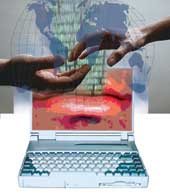 |
First came the Internet, triggering off a whole new revolution in the world of communication. Hand-in-hand came e-mail, chatrooms and e-commerce and before you could hit Enter, person-to-person interaction, as we knew it, was never the same again. But just in case you thought that this was about as far as you could go into the fascinating realm of cyberspace, it?s time to wake up and log on to the concept of blogging ? a cutting-edge phenomenon that may provide the platform for the Internet?s next wave of innovation and money-making opportunities.
For the uninitiated, a blog is an abbreviation of the term ?weblog?, which is more or less what it sounds like: a logbook maintained by people on the Internet. The diversity of topics and the detailed discussions that go on here about everything from food and sex to books, films and even something as innocuous as press releases, never ceases to amaze and might even leave you feeling a bit dazed. The once hip phenomena of chatting and e-mailing having lost their novelty, blogging is the Next Big Thing on the Net.
No magazine or newspaper can ever boast of achieving what weblogs do. First and foremost, blogs are personal, almost all of them being imbued with the personality of the writer. This personal touch is much more in tune with our current sensibilities than opinionated magazines and newspapers. The realisation dawns once you have a look at the real picture behind the curtain that fallible writers and editors are no more inherently trustworthy than a lone blogger who has snagged a reader?s interest.
Jai Arjun Singh, a journalist, swears by the effectiveness of this medium. He says, ?As a journalist, you might be proud of wielding the pen. But it?s a different ballgame altogether when you find yourself almost unconsciously writing to please a handful of people ? editors looking for a certain kind of story, publishers seeking to push a particular venture or advertisers who influence the editors and owners.? Blogging simply bypasses this ancient ritual and ? to invoke Marx ? seizes the means of production.
If you?ve held a life-long grudge against newspapers, magazines and their editors who have refused to publish your literary outpourings (which you think definitely merit two columns of space everyday), here?s hope for you to have yourself heard. While you?re at it, why not dispense with the agents and publishers in the book market as well? Blogging lets you build an online presence with your daily musings and sell your first book through print-on-demand technology direct from your website.
And who better to vouch for this than the anonymous Belle De Jour. If you are a dedicated member of the blogging community, you wouldn?t say ?Belle who?? For the jottings of this woman who describes herself as a London prostitute and details her adventures on the Net, has created a world-wide stir. And she is all set to publish her blog in the form of a book, Belle De Jour, Diary of a London Call Girl, setting the most notorious example of a new literary trend: sensationalism in blog form.
The anonymous prostitute?s diary is a familiar genre in erotic fiction, one, that in print, probably wouldn?t float many boats these days. But via the blog form?s sense of immediacy, Belle de Jour has revived the clich?s so successfully that publishers are offering six-figure advances and journalists are desperate to find out who the real Belle de Jour is. But her identity, call girl or literary hoaxer, is something of a side issue. The blog gets so much attention because, with its teasing sequence of daily ?entries?, it tells an old story in a new way.
Blog fiction poses specific challenges for authors. Some readers visit them every day and hence end up following a standard narrative chronology, but others arrive mid-story. ?So each entry needs to be self-contained, while providing access to other posts that explain more details, either by linking or encouraging the reader to look through the archives,? says Bhaskar Sengupta, a software executive, who loves going through blogs.
| THE HIT LIST |
| A peek at the most popular weblogs on the Net • www.belledejour-uk.blogspot.com: A London prostitute’s blog describes her sexual encounters with clients in sometimes explicit detail as well as her relationships with friends and lovers. Belle entered the public eye when she won an award from The Guardian last year. • www.iambelledejour.com: The hunt for Belle even spawned a spoof website called I Am Belle de Jour, that offered the chance to confess to being Belle de Jour and buy a shirt. • ww.dear_raed.blogsspot.com: A 29-year-old middle-class man somewhere in the suburbs of the Iraqi capital has become one of the most intriguing stories on the Net. Known simply as Salam Pax, his online diary has fascinated readers with his sharp observations on the tumultuous six months in war-torn Iraq. • www.deadmaneating.com: Called Dead Man Eating, this blog lists last meals as requested by men condemned to die, along with a brief history of their crimes. |
Diego Doval grappled with this in his ?blognovel? Plan B. An episodic office comedy that took readers into the mind of a stressed cubicle jockey, it went online in 2002. Doval says he ?wanted to see what the medium could do? and tried to create a story people could enter at any point and still make sense of. He used links not to connect to real sites but to take readers to details from the back-story that might explain that day?s events.
The sense of immediacy is the key in blogging. Doval didn?t plan a story in advance, but improvised each day. Though readers don?t ?direct? the story, the response from them every day probably did have an effect. Sengupta adds: ?When you?re writing, there is a kind of idealised reader in your mind. Here, the idealised reader becomes very real with people sending e-mail and commenting on their own blogs.?
The blog form is highly addictive too, as Belle vouches for in her last entry (September 15, 2004): ?When this blog started, it was with no expectations. I?ve never lived life to a plan aside from enjoying myself and have (for the most part) enjoyed doing this. I?ll miss this. The time will never be right to finish the diary ? so I am ending right now?
In its cradle days in 1994, the phenomenon now called blogging was little more than the sometimes-nutty, sometimes-inspired writing of online diaries. Now there are tech blogs, sex blogs, drug blogs and teenage blogs. But there are also news blogs and commentary blogs, sites packed with links and quips and ideas and arguments that only months ago were the near-monopoly of established news outlets. In 1999, the bandwagon jumping began as more and more people began publishing their own weblogs.
Some may see blogging as a trifle self-indulgent, what with authors commenting on everything ? from what they think of the war in Iraq to what happened to them on their way to work ? some see it as an extension of freedom of expression. The reader?s interest, however, stems from the fact that they may find resonance from their own lives and thoughts in what the blogger has written.
Notes from France by a Bengali woman living in France is a case in point. She writes on travelling by local trains to Gare de ?est in Paris. ?This 30-minute ride is one of my favourites. The big glass windows look out at the most wonderful pastoral scenes. What I call ?Tintin country?. Scenes that I had, growing up as a child in India, seen in Tintin comics,? writes Sukanya Majumdar.
For Tintin fans, this is an immediate association that links them to the author. Common interests and passions connect unknown people from all over the world and makes them part of a global community. Blogging then, is also an effective means of communication and finding like-minded people, only at a more cerebral level than through chatting.
Then there are those miscellaneous titbits that might astonish you. Did you know that Tintin is a Belgian, that he?s actually Tan-tan and not ?Tin-tin? as we pronounce his name in English? Snowy is Milou, Cuthbert Calculus is Professor Tournesol (sunflower), the priceless twins are Dupont and Dumont. Only Captain Haddock remains unchanged.
As Sukanya writes in her blog, ?Herge based Marlinspike on a chateau in France called Cheverny. I visited it some years back and was amazed! It was exactly as in the comic book. The current owners live on the topmost floor. I expected a dazed Calculus to come tripping down the staircase any moment!?
Going through the views of other people, readers can readily question and evaluate what is being said and hence embark on a journey of self-discovery. Shortly after she began writing her blog, Rebecca?s Pocket, author Rebecca noticed two side-effects she had not expected. ?First, I discovered my own interests. I thought I knew what I was interested in, but after linking stories for a few months, I could see that I was much more interested in science, archaeology, and issues of injustice than I had realised. More importantly, I began to value my own point of view more highly,? she says.
This profound experience may be most purely realised in the blog style. The blogger is compelled to share his world with whoever is reading and he/she may engage fellow bloggers in conversation about the interests they share. He may reflect on a book he is reading, the behaviour of someone on the bus or even on Julia Roberts? smile like Jai Arjun, who describes the actress in his blog as ?Hollywood?s toothiest lead performer since the shark in Jaws?.
Bloggers, by virtue of simply writing down whatever is on their mind, will be confronted with their own thoughts and opinions. A community of 100 or 20 or three people may spring up around the public record of their thoughts. Being met with friendly voices, they may gain more confidence in their view of the world; begin to experiment with longer forms of writing, to play with haiku, or to begin a creative project ? one that would have been dismissed as impossible a few months before.
The most interesting blogs are often the most intriguing. For instance, there was this anonymous blogger during the American war on Iraq, who spoke uninhibitedly on the Saddam regime. ?Ah, that mother. How she made me angry in the beginning. I couldn?t stand to see her on screen ? convincing the world that joining the army was the ideal thing to do...I hated her even more as they showed the Iraqi victims ? the burning buildings, the explosions, the corpses ? the dead and the dying. I wanted to hate her throughout the whole film because she embodied the arrogance and ignorance of the people who supported the war,? says this excerpt from a young girl?s blog called Baghdad Burning as she gives voice to her feelings on seeing an American mother before and after she lost her son in Iraq.
She adds: ?The irony of the situation is that the one place in the world she would ever find empathy was Iraq. We understand. We know what it?s like to lose family and friends to war, to know that their final moments weren?t peaceful ones... that they probably died thirsty and in pain...that they weren?t surrounded by loved ones while taking their final breath.?
Whether it?s an anti-war protester giving vent to her feelings about the futility of the Iraq war, celebrities sharing their everyday lives, trendy teens discussing the latest fads and fashions or computer geeks swapping high-tech insights ? when it comes to blogging, there is no issue sensational enough to uncover, no detail trivial enough to ignore. And at the end of the day, that?s what the real attraction of blogging is all about. The freedom to speak your mind in the boundless domain of the blogosphere ? a world where a thousand voices flourish, communicate? and connect.










